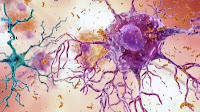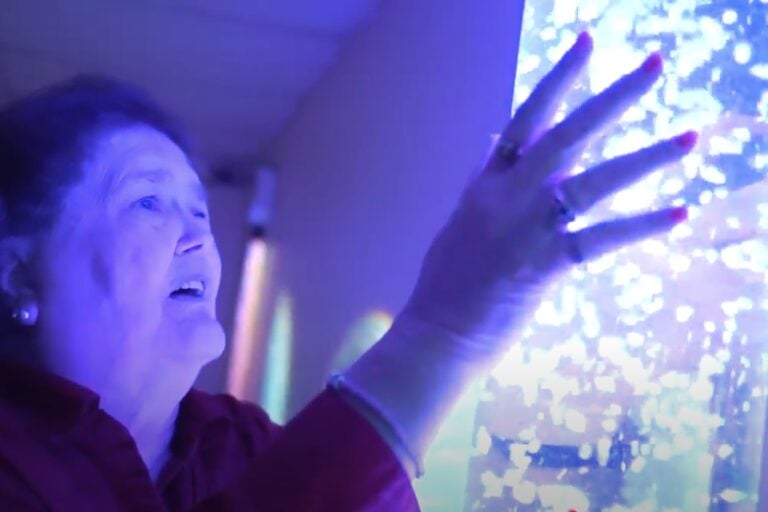GENETIC RESEARCH: Researchers at MIT studying the APOE4 gene are looking at choline supplements and asking whether they can offer protection against Alzheimer’s, based on genetic test technology.
Certain genes can increase the risk of developing dementia, including Alzheimer’s disease. One of the most significant genetic risk factors is a form of the apolipoprotein E gene called APOE4.
About 25 percent of people carry one copy of APOE4, and 2 to 3 percent carry two copies. APOE4 is the strongest risk factor gene for Alzheimer’s disease, although inheriting APOE4 does not mean a person will definitely develop the disease.
Lipid imbalance may play a role
The APOE gene comes in several different forms, or alleles. APOE3 is the most common and not believed to affect Alzheimer’s risk. APOE2 is relatively rare and may provide some protection against Alzheimer’s disease.
The reason APOE4 increases Alzheimer’s risk isn’t not well understood. The APOE protein helps carry cholesterol and other types of fat in the bloodstream.
Recent studies suggest that problems with brain cells’ ability to process fats, or lipids, may play a key role in Alzheimer’s and related diseases.
Lipid imbalances can impair many of a cell’s essential processes. This includes creating cell membranes, moving molecules within the cell, and generating energy.
Research method
Dr. Li-Huei Tsai and the late Dr. Susan Lindquist of MIT investigated how APOE4 affects lipid metabolism in brain cells. The study was funded by NIH’s National Institute on Aging (NIA), National Cancer Institute (NCI), and National Institute of Neurological Disorders and Stroke (NINDS).
Dr. Priyanka Narayan of NIH’s National Institute of Diabetes and Digestive and Kidney Diseases (NIDDK) was a co-first author. Findings were published in Science Translational Medicine on March 3, 2021.
The research team began by creating brain cells called astrocytes using stem cells. They used skin cells from people carrying APOE3 or APOE4 that were reprogrammed into a state where they could develop into any cell. Called induced pluripotent stem cells, these cells were then coaxed into becoming astrocytes, star-shaped cells that produce the most APOE in the brain.
Changes seen in lipid metabolism
The researchers found changes in how APOE4 astrocytes were able to process lipids. The astrocytes accumulated droplets containing fats called triglycerides. These triglycerides had many more unsaturated fatty acid chains than normal.
Lipid buildup in the APOE4 astrocytes was much greater than in APOE3 astrocytes. The researchers also found disruptions in lipid metabolism when they coaxed the cells into becoming other brain cells called microglia.
The team next tested whether yeast cells with the human version of APOE4 would have the same disruption in lipid metabolism.
Lipid metabolism pathways are very similar between yeast and humans. Yeast with a copy of the APOE4 gene accumulated lipids much like the human cells did.
Important findings
Genetic screens in the yeast identified a molecular pathway that could be responsible for the defects. Boosting the activity of a pathway that normally produces phospholipids — an essential building block of the cell membrane — reversed some of the lipid accumulation.
Further research showed that supplementing the yeast cells’ culture with choline restored normal lipid metabolism. Choline is needed to synthesize phospholipids.
Similar benefits were seen after treating the human APOE4 astrocyte cells with choline. These findings provide preliminary support for testing choline supplements in people who carry APOE4.
“What we would really like to see is whether in the human population, in those APOE4 carriers, if they take choline supplements to a sufficient amount, whether that would delay or give them some protection against developing dementia or Alzheimer’s disease,” Tsai says.
However, it is important to keep in mind that results from isolated cells don’t often translate into successful approaches when tested in people, the researchers add.
- Funding for the study was provided by: NIH’s National Institute on Aging (NIA), National Institute of Diabetes and Digestive and Kidney Diseases (NIDDK), National Cancer Institute (NCI), and National Institute of Neurological Disorders and Stroke (NINDS); Howard Hughes Medical Institute; Neurodegeneration Consortium; Robert A. and Renee E. Belfer Foundation; Ludwig Family Foundation; Kara and Stephen Ross.
SOURCE:
REFERENCE:
- APOE4 disrupts intracellular lipid homeostasis in human iPSC-derived glia. Sienski G, Narayan P, Bonner JM, Kory N, Boland S, Arczewska AA, Ralvenius WT, Akay L, Lockshin E, He L, Milo B, Graziosi A, Baru V, Lewis CA, Kellis M, Sabatini DM, Tsai LH, Lindquist S. Sci Transl Med. 2021 Mar 3;13(583):eaaz4564. doi: 10.1126/scitranslmed.aaz4564. PMID: 33658354.












That study was in vitro. Extrapolating such conclusions to humans would be unwise without further studies. Choline supplements are unwise: https://qr.ae/TjhXVj